By:
- Anthony King
Published Date
By:
- Anthony King
Share This:
Using Plague Diaries to Keep a Record of COVID-19
Humanities courses in history, philosophy and literature bring discussion of today’s pandemic into the classroom, offering students a unique way of learning
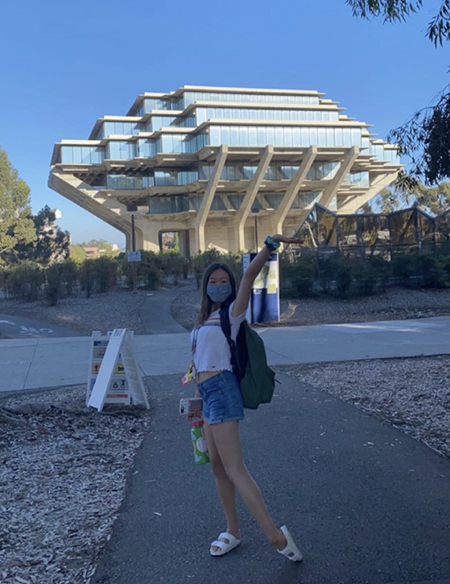
The first entry in Paige Nguyen's pandemic diary shows a quiet campus. Photo courtesy of Paige Nguyen.
The first photo in Paige Nguyen’s pandemic diary is full of complexities. The UC San Diego student’s eyes gaze back at the camera, her smile hidden by a mask and the iconic Geisel Library stands behind her without a soul in sight.
But there’s hope in her work, too. As a first-year student, Nguyen has yet to experience a full campus teeming with activity, but one assignment in her History of Public Health class— the term project “Diaries in the time of Plague”—brought this moment into sharp focus.
“Studying epidemics of the past is already an interesting topic, but even more so when you're living through a current pandemic,” Nguyen, an education studies major, said. Her “plague diary” now rests in the UC San Diego Library’s Special Collections & Archives.
“We learned a lot about looking back at the past [to] see what worked and what didn't work, but diseases are more than just a virus or bacteria—they also have a lot to do with social and political conditions,” she said.
Department of History associate professor Claire Edington, who is developing a book with University of California Press based on lessons from the course, has been teaching the history of public health for five years, and each year a new pandemic emerges: the most recent Ebola outbreak, the opioid epidemic and, this year, COVID-19.
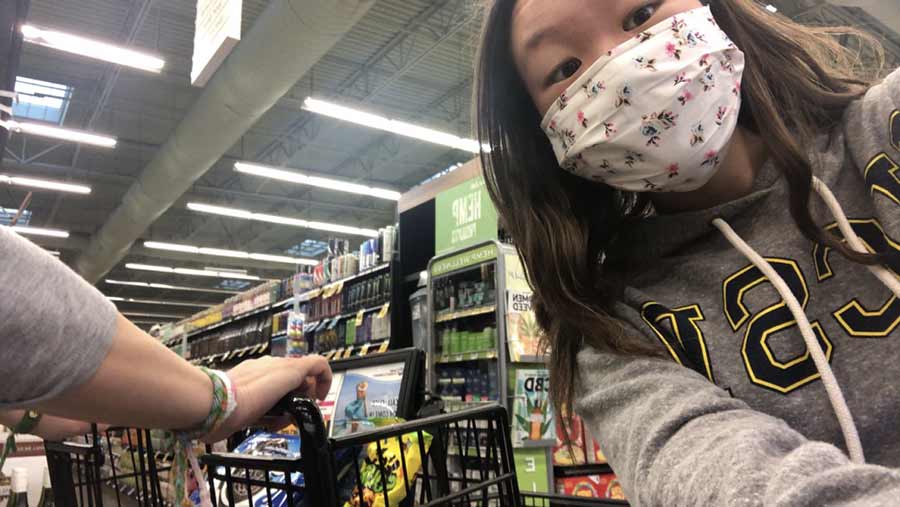
Paige Nguyen uses this photo of herself in a grocery store to comment on mask wearing and responsibility. Photo courtesy Paige Nguyen.
“The history of medicine has always served as an important window on social history, and looking at pandemics in general shows how epidemics have the potential both to reflect and remake our social world,” Edington said. “For instance, the recurrence of certain themes in the history of pandemics—the scapegoating of minority groups, or grassroots anti-vaccination movements—works powerfully to disrupt any linear narrative of progress. How do we mobilize the insights of history to create a more just, equitable world moving forward?”
Edington said the class explores the global history of epidemics in their unique historical context, and takes care to not centralize a European or United States perspective. The first use of gauze masks, for example, was in Manchuria during the pneumonic plague of 1910-1911, she said, and not the Spanish flu pandemic of 1918.
“Instead of looking for clear beginnings and endings, we look at how epidemics layer onto each other. They are not just discrete events,” she said. “The students really appreciate having this historical perspective, and it felt particularly poignant to be teaching this class now.”
Using the diaries as a way to process
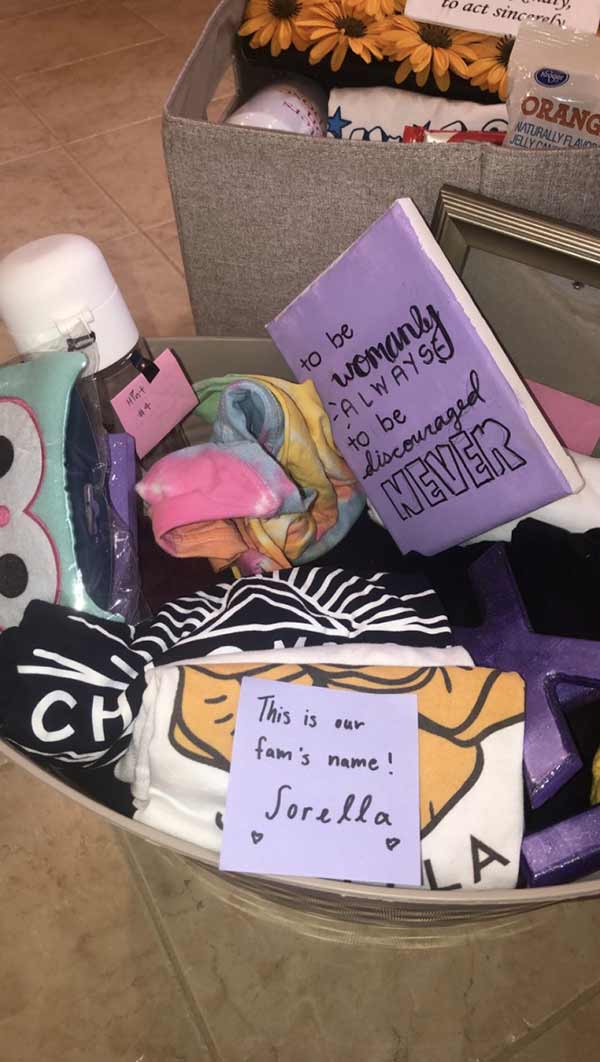
Paige Nguyen is part of the Chi Omega sorority, and her Nov. 13, 2020 entry explains how they adapted in-person traditions like gift giving to the pandemic. Photo courtesy of Paige Nguyen.
Just one portion of the class, students are not required to submit their diaries to the UC San Diego Library, and if they do, they can submit anonymously because much of the content is deeply personal. Edington said she wanted to give space for the class to be more reflective, as she’s aware this is a difficult time to be a student. She said she was surprised by how candid some of the submissions were, and was glad the students were able to open up.
“My biggest takeaway from this assignment was the importance of letting out emotions during this hard time,” said Anushka Sinha, a third-year biology student. Sinha said the assignment became an outlet, and voiced frustration about what the pandemic has taken away from their college experiences.
“There has been so much more focus on spreading hope and optimism during this pandemic, that somewhere we forgot to acknowledge our present feelings or our current state of mind,” Sinha said, a feeling reiterated by Morgan Korovec, a first-year student majoring in communication.
“Completing the diary assignment encouraged me to make time for self-reflection and to really think about the important things, even beyond the scope of college life,” Korovec said. “I realized it’s not possible to understand what everyone is going through, so it is especially important to practice kindness and to build strength together as a community.”
In preparation, the students read and reflect on first-person accounts from past pandemics, starting with the Athenian plague of 430 B.C.E. followed by the Black Plague of the mid-1300s and, lastly, a personal journal from Wuhan, China near the start of the COVID-19 pandemic. Entries could be in whatever format the students wanted: written, photographs with captions, drawings and art, and video diaries.
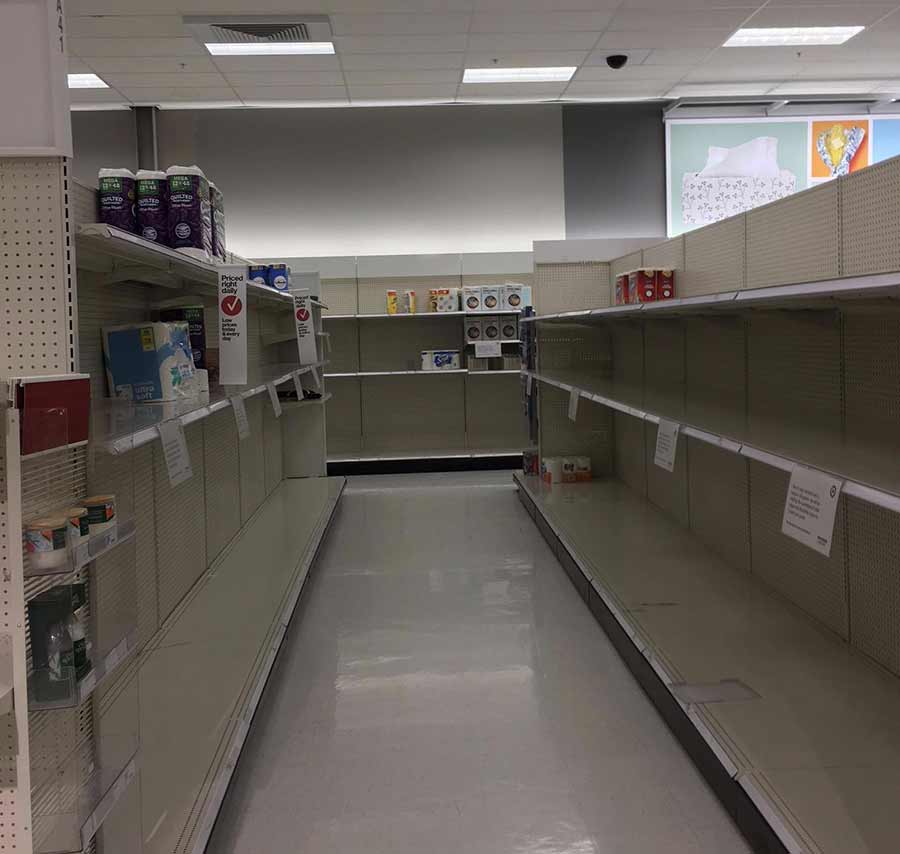
This photo of empty shelves accompanies an anonymous diary entry: "For some people, donating and helping others brings them comfort. While for others, excessively hoarding items and piling 6 cases of toilet paper in their carts seems to bring that same feeling of fulfillment."
“I noticed when Dr. Edington had us read plague diaries from the past, what makes these different from other primary historical sources is they’re much more personal. I wanted to emphasize that in my own diaries,” said Clara Pham, a first-year history major. Her diary entries were audio recordings, so she could capture more intimate moments of silence and sound.
“I thought it was more personal, and I wanted my audience to get another layer of vulnerability,” she said.
Recognizing the underlying connection to race
Edington’s fall quarter course is one of three featured humanities-based classes that adapted their syllabus to speak to today’s pandemic. In summer 2020, associate professor Saba Bazargan-Forward developed his Department of Philosophy class Ethics & Society to explicitly address issues pertaining to COVID-19, including moral discussion around face masks and forced quarantine, racism and disproportionate COVID-19 deaths, and privacy regarding contract tracing.

From an anonymous diary: "This house is not just a Halloween set up. Back in June, I stumbled across it. The yard is set up as a graveyard, warning people to keep practicing proper social distancing."
In the Department of Literature, assistant professor Erin Suzuki is currently offering Pandemic Fictions, looking at representations of pandemics in modern American fiction to highlight understandings of public health, race and economics. The intention is to “imagine ways to improve or push beyond these systems and structures,” the 2021 winter-quarter syllabus reads.
“The discussions are grounded in the narrative structure of pandemic literatures, as a way to get students to think about how much they have been conditioned to conceptualize outbreaks,” Suzuki said. “We’re conditioned to think of pandemics as having a beginning, middle and end, but they are clearly ongoing. So far, the class has been good for discussions because there is always something for them to compare these narratives to.”
Suzuki, whose research interests include Asian American literature and Pacific Island literatures, explained that in the texts for the class, pandemics are metaphors for something else—oppressive governments, racial inequalities—but for students today, “pandemic” is more than a metaphor. It is literal, and Suzuki encourages students to discover similarities in what they read and what they see.
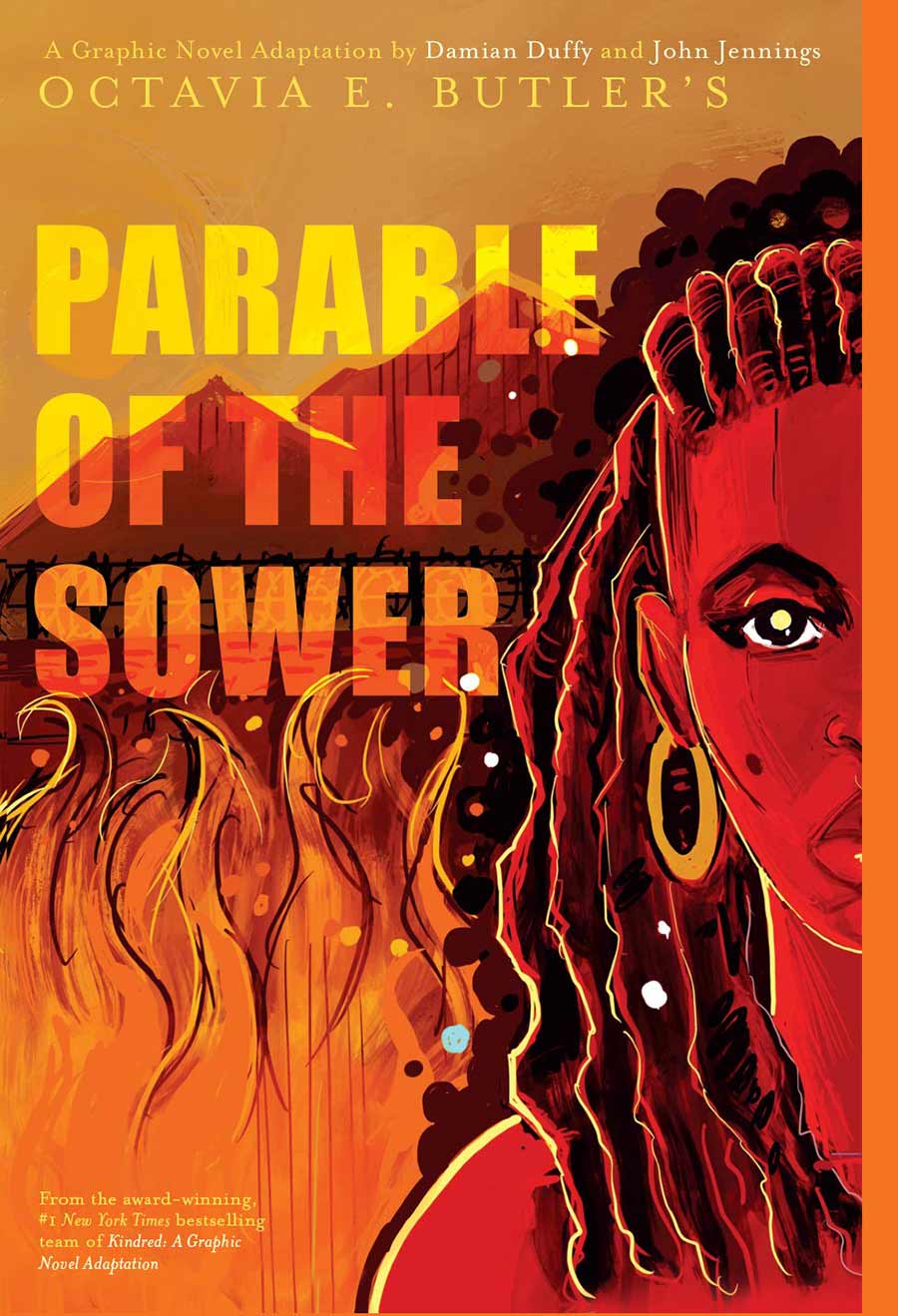
Octavia E. Butler's "Parable of the Sower," a graphic novel adaptation by Damian Duffy and John Jennings (Abrams ComicArts, 2020), is used in the Pandemic Fictions course.
“The COVID pandemic and the way it is manifesting reveals all of these fault lines around race in our society,” she said. “Race is always sort of a subtext to the pandemic in these narratives, and a lot of the students bring that up in the class.”
As literature, ancient and new philosophy, and historical record can provide nuance and perspective for multiple generations, the Library will make available the students’ pandemic diaries for future use. The students who have submitted to the archives are ensuring their stories are told, and Pham said she wants people to understand how today’s situation has influenced ordinary people, day to day.
“Our campus is a global campus, and I really do feel our curriculum should reflect the experiences of our students and give them a place to talk about their own stories,” Edington said. “The act of the diaries itself was like giving back to our community. It is an act of service.”
Share This:
You May Also Like
Stay in the Know
Keep up with all the latest from UC San Diego. Subscribe to the newsletter today.



